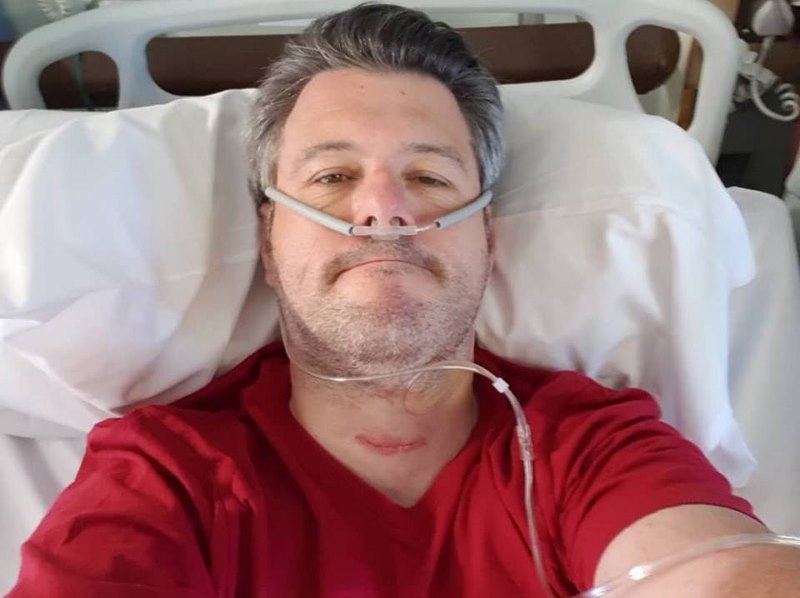In a recent post, I discussed the impact of your cancer on the people around you. In that post, I suggested that, ‘to some extent, a diagnosis of cancer impacts more on the patient’s loved ones, than on the patient themselves.’ And while I stand by this assertion, it does not mean that the impact of cancer on your life is negligible. Indeed, this is far from the case, as I will shortly explain.
Before I do so, however, I’d like to apologise for the delay gap between posts. It’s been six weeks since I posted anything meaningful and that’s simply not good enough. Oddly enough, now I’m writing this, I realise that the reason for the delay ties nicely into the topic of the post…
You see, I had another surgery last week, on the 10th September, it was a Hemithyroidectomy. Which is to say that the right side of my Thyroid Gland was surgically removed. The reason for this was that the PET/CT Scan I had earlier in the year showed a lump in my neck. A fine needle aspiration revealed follicular proliferation and the standard course of events, in this situation, is to remove the affected half of the thyroid, as a biopsy. A fuller explanation of this process can be found here.

I’d known this was coming for months, but only got confirmation just before our recent holiday. My wife and I then decided to keep this to ourselves until just before the operation so as not to spoil events that would happen prior to the surgery, including:
- My parents’ holiday
- Our family holiday
- My older daughter starting at college
- My younger daughter starting back at school
The result of this decision, while the right one for my family, weighed heavily on me. I don’t like keeping secrets; it’s often too close to lying for my comfort. As such, I couldn’t concentrate, I couldn’t focus, I couldn’t write. Which is why there have been no posts for so long. You see; an actual, relevant example of the impact of cancer on your life.
I’d like to say I planned it this way, but…
Anyway! Broadly speaking, the impact of cancer on your life can be separated into:
- Physical impact;
- Financial impact, and;
- Mental impact.
Clearly, these are not mutually exclusive and all interact with each other. But difficulties in one, or both, of the first two, tend to get magnified in the third.
Financial Impact

Photo by rawpixel on Unsplash
I’ll deal with this one first, because it’s the one I have the least direct experience of. It’s also the most difficult to discuss because every country has different processes and procedures in place, and I only have experience in the UK. Hopefully, however, the links I will provide here will allow successful searches to be undertaken in other countries.
In my instance, my wife and I own a company together and, by the time I was diagnosed with cancer, I had already been relegated to the role of ‘silent partner’. Or ‘stay at home dad’. Or ‘house husband’. Frankly, she didn’t mind what I called myself, providing I stayed away from the office, where I was labelled a ‘disruptive influence’.
As if!
My point being, as a share holder I could continue to receive drawings, meaning I was financially secure. Despite being, more or less, bed-bound for the better part of a year. What with sickness, symptoms and surgery, I wasn’t in much of a position to get into work. And the work in question would have been office based. Had my job been site or manual focused, I’d have had even less chance.
For the majority of newly diagnosed cancer patients in their middle age, or older, not only is there a job to hold down, there is a mortgage to pay and all the other outgoings to consider. It is important to address these issues as quickly as possible, because, once the chemotherapy starts, it’s likely to get very much more difficult, very quickly.
If you’re working, then you’re entitled to Statutory Sick Pay (SSP). At the time of writing, SSP is £92.05 a week, for 28 weeks. You also accrue annual leave during this time, which you’re allowed to take, but it’s often not enough to support a household.
Whether or not you’re working, the Government offers various benefits in certain circumstances, but this is an ever-changing landscape. As such, I’ll offer the link to the excellent Cancer Research UK page on:

Photo by Michael D Beckwith on Unsplash
While I’m referring to the Cancer Research UK site, I’ll also link to other of their useful pages on the topic:
It would also be a good idea to talk to your bank, at an early date, especially if you’re likely to need an overdraft or loan. That other great stalwart of cancer patients, MacMillan, has the answers here:
To be fair, the banks that MacMillan have managed to form partnerships with, so far, are limited to Lloyds, Bank of Scotland and Halifax. That said, if you explain your situation to your bank, and they’re unhelpful, if you explain that you’re going to move to one of those three because they are helpful, this may well persuade your bank to buck up its ideas. Especially if a lot of people are doing the same thing.
Hopefully, though, by exploring the options, above, at least the financial aspects of the impact of cancer on your life can be mitigated.
Physical Impact

Photo by Rhone on Unsplash
I have discussed various elements of the physical impact that both my cancer and it’s treatment had on me in previous posts. As such, I won’t go into great detail here but will provide links to these other posts.
In terms of the physical elements of the impact of cancer on your life, these come in three stages:
- Before treatment
- During treatment
- After treatment
Before treatment, which includes the period before your diagnosis, the physical impact of cancer on your life is restricted to the signs and symptoms of your particular cancer. In my case, bowel cancer, the main physical symptoms were: change of bowel habit, and; exhaustion on physical exertion.
For my experience of the signs and symptoms of bowel cancer, see here. For the key signs and symptoms of cancer, in general, see here.
During treatment, the physical impact of cancer on your life is likely to be at its most extreme. In my case, I had surgeries on both my liver and bowel, which also resulted in complications.
Generally speaking, though, after any surgery there’s going to be an element of pain and discomfort during the recovery process. The faster you are able to get up and around and back on your feet, the less of an impact this discomfort will have.
I also had chemotherapy, which led to both side effects and complications. For me, though, the biggest single impact on my life was the nausea I felt.

Photo by rawpixel on Unsplash
Feeling sick for days at a time is draining. It also leaves you stuck in bed and unwilling or unable to move. Most of the physical impact of cancer on my life stemmed from this enforced inactivity, both during and after treatment.
At times when I was stuck in bed, hygiene became an issue; I wasn’t able to shower as often as I wished. Which, ultimately, and in combination with my increase in weight, led to pressure sores. The immobility also caused a deep vein thrombosis (DVT), which shifted, on New Year’s Eve of all times, and hospitalised me with a pulmonary embolism (PE).
After treatment, the cumulative effect of all that has gone before catches up to you and becomes apparent.
By the time I’d spent most of a year in bed, I was heavier than I’d ever been. Additionally, I’d lost a lot of muscle mass and tone. This meant that my percentage body fat was far higher then it had ever been.
And I was hugely unfit. I’m normally quite a fit and active person, albeit rather overweight at the same time. I play (field) hockey, I hike, I cycle; I’m fit. Normally. After treatment, I wasn’t. I was a wreck!
It took several months to get to the point I started feeling ‘normal’ again. I started off feeling exhausted after walking around the green in front of my house; a distance of 200 meters. More than one flight of stairs was a nightmare. It was tough!
I got there in the end but the process of recovering my fitness was draining, both physically and mentally.
Mental Impact

Photo by Noah Buscher on Unsplash
Which brings me to the impact that cancer has on your mind. And I don’t really include Chemo Brain in this category. Despite, and somewhat confusingly, waiting to mention Chemo Brain until now, I think of it more as a physical issue: something that is being done to your brain by the medicine. As opposed to something that’s being caused by internal processes.
Which is why I’m mentioning Chemo Brain here, to emphasis that, for me, the mental impact of cancer on your life, is the way it makes you think and feel. Not what externally administered drugs do to your mind.
I’m also not going to dwell on the impact that the financial and physical aspects, I’ve covered above, have on the mental impact of cancer on your life. Many of us already spend too much time worrying about our finances and our fitness. Sure, having cancer makes these tougher to deal with, but we are all used to dealing with them.
The mental impact of cancer on your life may well be, as it was for me, in the form of Scanxiety. The word is a blend of ‘scan anxiety’ and it is far more commonly used than, until recently, I’d been aware of. And it’s good that it is, because I find it quite debilitating.
I tend to start getting nervous a couple of days before a scan. It doesn’t matter what the scan is, be it MRI, CT or PET/CT; it’s not the scan that worries me, it’s what it might reveal.
After the scan, it usually takes about two weeks to get the results. And it is in this time that the Scanxiety really kicks in. For me, it’s a reaction to the uncertainty. At this stage, the results exist… people know whether there is cancer in my system, or not. But I don’t know.
I could know, but I don’t.
Which means I could be preparing for what comes next, but I haven’t been given the knowledge to do so. And I do understand the reasons why. The results got to the oncologist. She takes them to the Multidisciplinary Team (MDT) meeting, which, in this instance, happens on a Monday morning. The MDT look at my case and make a decision. Only then, can I be brought into the loop.
You see, I do get it. I completely understand the processes involved. And it doesn’t matter.
During the wait, my anxiety increases and I’m more prone to feel depressed. I lack my usual levels of focus and concentration and struggle to get much done. In my case, this means I might miss a few posts. For people who have to go to work, this must get very difficult.
That said, my wife is of the opinion that if I had a sensible job, that I had to attend, I’d be able to focus on that and distract myself. But then what does she know; she married me! If that isn’t a clear indication that her judgement can’t be trusted, I don’t know what is.
These feeling of Scanxiety don’t seem to get better with time. I have my next scans on the 11th and the meeting with the Oncologist on the 24th. I suspect the intervening weeks are going to suck.
Outside of the clearly defined periods of Scanxiety the mental impact of cancer in your life is likely to present as some element of background worry. Worry about what’s going to happen to you. Worry, also, about what’s going to happen to your loved ones. This worry is likely to come and go in intensity and can easily be triggered by traditions and celebrations. Like a child’s birthday. This can prompt feelings of worry about how many more of these you’re going to be around for.
This, in its course, can also result in feelings of guilt. Particularly, if you feel yourself to have, to any extent, contributed to your cancer. I, for example, have been overweight for a long time. Obesity increases the risk of bowel cancer. As such, I have to accept the possibility that I contributed to my getting cancer in the first place. And putting my family through all this. Guilt!
The only real solution I’ve been able to find, to manage these ongoing concerns is to talk about them. When I fail to talk about them, bad things happen. As I would find out later, these ‘bad things’ included depression. But I’ll cover my depression a couple of posts down the line.
I’ve been very fortunate in that I can talk to my wife, as I discussed in my post on how cancer impacts the people around you. I’ve been able to talk to my wife, because she has other people that she talks to.

Photo by gabrielle cole on Unsplash
But, from the point of view of the cancer patient, it’s vital to have someone to talk to, whoever that might be, and there are a variety of options to consider (in alphabetical order):
- Charity helpline
- Family member
- Friend
- Hospital support staff
- Mental health professional
- Online community
- Significant other
- Spouse
- Support group
The mental impact of cancer on my life was much bigger than I expected. I wasn’t prepared for it, and I struggled. But, there’s no reason to. As MacMillan point out, no one should face cancer alone. And with the options, listed above, there’s no need to.
If you take nothing else away from this, please, please make sure you find someone you can talk to. Hell, talk to me, if you can’t find anyone better. I’ll help the best I can.
The impact of cancer on your life, as a cancer patient, is huge. But, if you’re willing to accept a little bit of help, every now and again, it’s manageable. And manage you will.